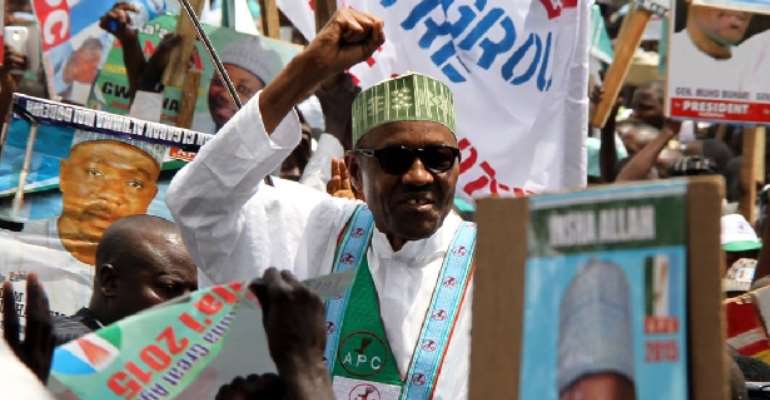SO BUHARI IS THE BEST APC CAN OFFER

Is Muhammadu Buhari really the best the opposition All Progressives Congress has to offer? This question has come to the fore since Buhari, Nigeria's former military strongman, beat the likes of former Vice-President Atiku Abubakar, Kano state governor Rabiu Kwankwaso, Imo state governor Rochas Okorocha and Leadership publisher, Sam Nda-Isaiah, to clinch the presidential ticket of the All Progressives Congress. His victory at the December 11, 2014 national convention has the imprimatur of former Lagos governor, Bola Tinubu—and so does the choice of Professor Yemi Osinbajo as his running mate, raising disquiet within the party of a grand design by two power blocks to corner the party and its decision making process.
The internal contradictions in the party pale into insignificance if the barrage of attacks so far generated by Buhari's nomination is considered. What have come into focus since that victory are the credentials Buhari brings into the contest and why he has arrogantly refused to come to terms with his sordid past. This question whether he is really the best the APC can offer, becomes pertinent considering the huge baggage of negative perception associated with his tenure as Nigeria's military leader.
Buhari's past will always haunt him politically. His actions as military Head of State between December, 1983 and August, 1985, the documented cases of ethnic bias against him, his tainted democratic credentials, his flawed judgment on public policy and his warped worldview, have been the reasons for his failure in successive presidential contests from 2003 to 2011. Whether 2015 will be different depends on how the questions surrounding his democratic credentials are interrogated. That his name continues to be mentioned in many high-profile cases of abuses ranging from rights infringement to murder, certainly does not help, just like the perception that he still harbours such sadistic dispositions — a perception that cost him the three previous contests in 2003, 3007 and 2011.
The charge of ethnic bias has trailed Buhari throughout his public life. It manifested in 1984 when he bent the rules to accommodate the father of his then aide-de-camp, who had smuggled in 53 suitcases loaded with Nigerian currency when he had supposedly shut the borders for a change of the Nigerian currency. Also as chairman of the defunct Petroleum Trust Fund (PTF) that was set up by the late Head of State, General Sani Abacha, he converted what was a national assignment to the benefit of a certain section of the country. At the end of the PTF activities, those who had viewed Buhari as a nationalist were dismayed to discover that he ran the PTF like a sectional enclave.
His cancellation of the Lagos metroline project conceived by Second Republic governor of Lagos State, Lateef Jakande, is an instance of poor judgment of public policy. That singular act on that project, designed to build underground transport system to address the chaotic traffic situation in the state, is still blamed for the transportation challenges in that mega city.
The government, which Buhari led was a dictatorship of the worst kind, but the fact that he arrogantly stands by his draconian laws and official high-handedness is unimaginable. A true statesman should have the courage to admit errors of the past for it is only then that it can be used as a guide to the future. His ascension to leadership of the nation witnessed an unprecedented hounding of politicians into detention and jail, most of them on trumped up charges of corruption: to demonise the political actors of the time and legitimise his action of sacking a democratically elected federal government.
The obnoxious Decree 4 under which two prominent journalists, Tunde Thompson and Nduka Irabor, were jailed for a story they published in The Guardian newspapers is a case in point. Buhari's government's attempt to kidnap Umaru Dikko, Second Republic Transport minister who had taken refuge as an exile in London, is another. For the general, he has developed thick skin to such criticisms of his poor human rights record but for him, it is a road well travelled. The question is: are these issues Nigerians are prepared to associate with their President? For a man who desires to lead, Buhari is as unbending as he was thirty years ago and his arrogance continues to manifest in his statements and actions today. The conclusion is obvious and the fear that he will visit the country with worse policies and draconian rule, are not misplaced after all.
By the time the 2015 presidential election is held next February, Buhari would have broken all records as the only Nigerian to have sought election to that high office four consecutive times: in 2003, 2007 and 2011. The All Progressives Congress (APC) on which platform he has indicated interest in contesting the position again, will be his third political party; the previous ones being the All Nigeria Peoples Party (ANPP) and the Congress for Progressive Change (CPC). Why the desperation?
He has possibly forgotten the message serially delivered by Nigerians in 2003, 2007 and as recent as Saturday, 16 April, 2011 when the Congress for Progressive Change on which platform he contested, lost the 2011 presidential election to President Goodluck Jonathan of the Peoples Democratic Party. Not only was the defeat emphatic, it was also believed to signpost Buhari's journey to political retirement after a career in which his electoral performance has always been far below his rating. How he squares up against candidate Goodluck Jonathan who is virtually unblemished by any negative allegations or stigmas, will be interesting.
Writte by Mustapha Abdullahi
